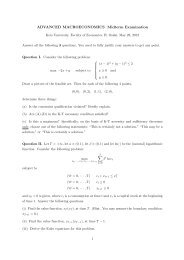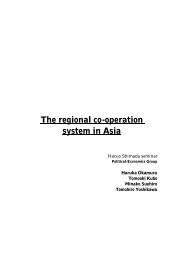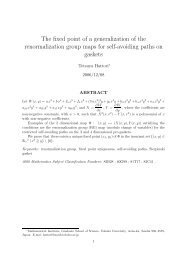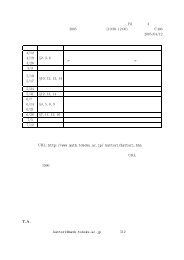Faculty of Economics, <strong>Keio</strong> <strong>University</strong>Term Papers: Each student is requested to submit a draft term paper at the Office ofStudent Services (Academic Services) by 9th July 2010.He/she can choose two topics from the “Questions <strong>for</strong> Discussion” part of Chapters 2, 3,4, 9, 12 and 14, and write short essays on them. It is expected that each essay is about800 - 1,000 words long, but topics need to be selected from different chapters. Duringthe course, each student is requested to make a presentation on one of his/her essays. Atthe last session, each student will have an opportunity to revise and finish one selectedessay as a final term paper, be<strong>for</strong>e submission <strong>for</strong> grading.OPEN ECONOMY MACROECONOMICSb(<strong>PCP</strong>)Lecturer :Sahoko Kaji, ProfessorCourse Description:This class is offered to undergraduate students participating in the <strong>Professional</strong> <strong>Career</strong><strong>Programme</strong> (<strong>PCP</strong>), Master’s level graduate students and exchange students.The purpose of this class is to introduce basic concepts and basic analytical frameworksof Open Economy Macroeconomics, and to encourage students to apply them inthinking about real-world issues. Students who attend this class are assumed to havesufficient knowledge of entry-level macroeconomics and microeconomics.Each week, at the beginning of class, students take turns presenting what they learned inclass a week ago. Students who are not presenting that week are expected to activelyparticipate in others' presentations by asking questions and making comments. Allstudents should also actively participate in the lecture that follows the students'presentations, by asking/answering questions and making comments.Evaluation is 50 % by class participation/presentations and 50 % by final examination.Textbooks:Lecture Notes: http://ocw.dmc.keio.ac.jp/economics/index.htmlReference Books:・ Canzoneri, M. and D. Henderson (1988) “Is Sovereign Policymaking Bad?”Carnegie-Rochester Conference Series on Public Policy No.28, pp.93-140・Dornbusch, Rudiger (1980) Open Economy Macroeconomics, Basic Books, Chapter10, Chapter 11・Kaji, Sahoko (2004) Kokusai Tsuka Taisei no Keizai Gaku (The Economics ofExchange Rate Systems), Nihon Keizai Shimbun PublishingCourse Plan:I. A Review of Closed Economy Macroeconomics<strong>PCP</strong> <strong>Syllabus</strong> 14
Faculty of Economics, <strong>Keio</strong> <strong>University</strong>IS-LM Analysis, Aggregate Supply, and Aggregate DemandII. Basic Concepts in Open Economy MacroeconomicsSmall Country Assumption, Stock vs. Flow, The Balance of Payments,The Exchange Rate, The Interest Rate Parity ConditionIII. Theories of Exchange Rate DeterminationPurchasing Power Parity, Stock Equilibrium Approach,Flow Approach, The Marshall-Lerner Condition, The J-curve EffectIV. The Mundell-Fleming ResultsThe M-F Result and the Structure of the Model --- a Simple Model,The M-F Result under Fixed Exchange Rates,Alternative Assumptions: Two-Country, Imperfect Capital Substitution,The M-F Result under Flexible Exchange Rates,Alternative Assumption: Two-CountryV. The Speed of Adjustment of Endogenous Variables and OvershootingVI. Economic Interdependence and Choice of Exchange Rate RegimesOPEN ECONOMY MACROECONOMICSa(<strong>PCP</strong>)Lecturer :Sahoko Kaji, ProfessorCourse Description:This class is offered to undergraduate students participating in the <strong>Professional</strong> <strong>Career</strong><strong>Programme</strong> (<strong>PCP</strong>), Master’s level graduate students and exchange students.The purpose of this class is to introduce basic concepts and basic analytical frameworksof Open Economy Macroeconomics, and to encourage students to apply them inthinking about real-world issues. Students who attend this class are assumed to havesufficient knowledge of entry-level macroeconomics and microeconomics.Each week, at the beginning of class, students take turns presenting what they learned inclass a week ago. Students who are not presenting that week are expected to activelyparticipate in others' presentations by asking questions and making comments. Allstudents should also actively participate in the lecture that follows the students'presentations, by asking/answering questions and making comments.Evaluation is 50 % by class participation/presentations and 50 % by final examination.Textbooks:Lecture Notes: http://ocw.dmc.keio.ac.jp/economics/index.htmlReference Books:・ Canzoneri, M. and D. Henderson (1988) “Is Sovereign Policymaking Bad?”<strong>PCP</strong> <strong>Syllabus</strong> 15
- Page 1 and 2: Faculty of Economics, Keio Universi
- Page 3 and 4: Faculty of Economics, Keio Universi
- Page 5 and 6: Faculty of Economics, Keio Universi
- Page 7 and 8: Faculty of Economics, Keio Universi
- Page 9 and 10: Faculty of Economics, Keio Universi
- Page 11 and 12: Faculty of Economics, Keio Universi
- Page 13: Faculty of Economics, Keio Universi
- Page 17 and 18: Faculty of Economics, Keio Universi
- Page 19 and 20: Faculty of Economics, Keio Universi
- Page 21 and 22: Faculty of Economics, Keio Universi
- Page 23 and 24: Faculty of Economics, Keio Universi
- Page 25 and 26: Faculty of Economics, Keio Universi
- Page 27 and 28: Faculty of Economics, Keio Universi
- Page 29 and 30: Faculty of Economics, Keio Universi
- Page 31: Faculty of Economics, Keio Universi






